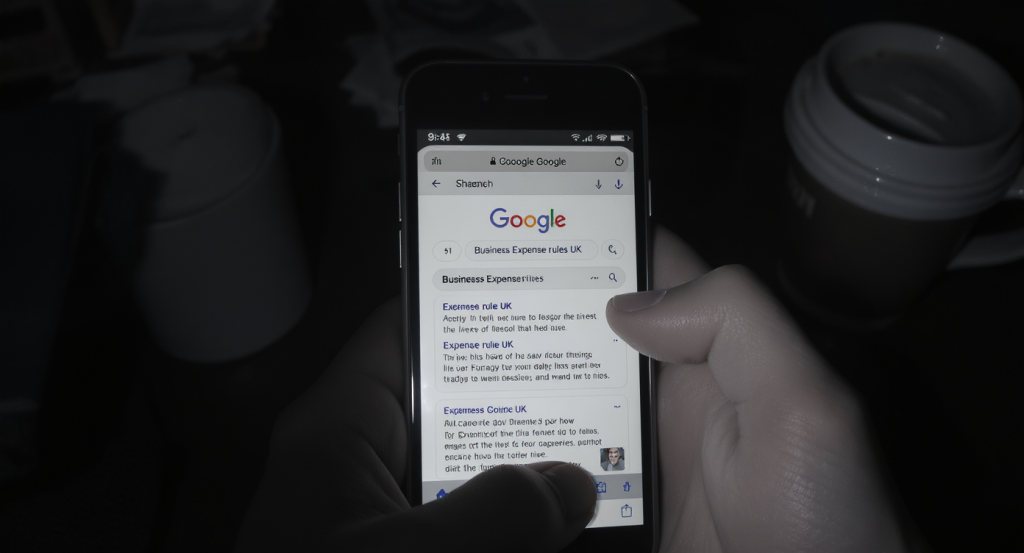
Let me guess. You’re sitting there with a spreadsheet that looks like hieroglyphics, wondering if depreciation is something that happens to your car or your soul. Meanwhile, your business is growing faster than weeds after rain, and you’re drowning in receipts that multiply overnight like some sort of financial rabbits.
Here’s the thing nobody tells you about running a business: the accounting doesn’t get easier just because you’re getting better at everything else. In fact, it gets more complicated, more demanding, and frankly, more terrifying. That monthly ritual of “doing the books” transforms from a mild inconvenience into a full-contact sport with HMRC.
But what if I told you there’s another way? What if you could hand over those financial nightmares to someone who actually enjoys untangling tax codes and finds VAT returns oddly satisfying?
Welcome to the world of outsourced business accounting—where your stress becomes someone else’s specialty, and where 71% of accounting professionals believe AI will have a substantial impact on the industry 2025 Outsourced Accounting Trends: What Businesses Need to Know in 2025.
The Moment You Know It’s Time (And Why 2025 is Different)
There are telltale signs when your DIY accounting approach has run its course. Maybe you’ve spent three hours trying to categorise a single transaction that could be office supplies, equipment, or possibly a charitable donation (you honestly can’t remember). Perhaps you’ve discovered that “putting everything in a shoebox” isn’t actually a recognised accounting method, despite what your uncle Dave suggested.
The breaking point usually arrives quietly. One day you’re confidently managing your own books, the next you’re googling “can I claim my dog as a business expense” at 2 AM. (The answer is probably no, unless your dog is genuinely contributing to your marketing strategy.)
But 2025 brings unique pressures that make this decision even more pressing. The talent deficit in finance and accounting is estimated to potentially reach 3.5 million by 2025 Finance and Accounting Outsourcing Trends to Watch in 2025 – Auxis. 51% of finance and accounting managers say hiring quickly enough to land top talent is one of their top recruiting challenges Finance and Accounting Outsourcing Trends to Watch in 2025 – Auxis.
For most business owners, the tipping point comes when the cost of their own time—time spent wrestling with accounting software, deciphering tax regulations, or fixing mistakes—exceeds what they’d pay a professional. It’s basic economics, really, though it feels more like admitting defeat.

What Nobody Warns You About Professional Accounting Services in 2025
Professional accountants aren’t just number-crunchers with pocket protectors (though some might still wear them ironically). They’re financial translators who speak fluent HMRC and can spot deductions you never knew existed. More importantly in 2025, they’re early adopters of technologies that most business owners can’t afford to implement themselves.
Outsourced accounting firms make substantial investments in adopting the latest FinTech innovations like automation, AI, and cloud computing Why UK Businesses will Increasingly Embrace Outsourced Accounting Solutions in 2025 – Accrels. This gives them capabilities that would cost individual businesses thousands to develop in-house.
Take CIS claims and refunds, for instance. If you’re in construction, you might be overpaying tax without realising it. The Construction Industry Scheme is Byzantine in its complexity, but for someone who deals with it daily? It’s just Tuesday morning.
The real value isn’t in the calculations—it’s in the peace of mind. When Ask Accountant handles your bookkeeping and tax advisory solutions, you’re not just buying mathematical accuracy. You’re purchasing the ability to sleep through the night without wondering if you’ve accidentally committed tax fraud by categorising coffee as “fuel expenses.”
Here’s what actually happens when you outsource accounting for your business:
Your accountant becomes your financial early warning system. They spot trends before they become problems, catch errors before they become penalties, and identify opportunities before they disappear. It’s like having a financially literate guardian angel, except they charge by the hour and prefer email to miraculous interventions.
The Hidden Mechanics of Getting Started
Step one: Audit your current chaos. Gather everything—and I mean everything. Bank statements, receipts, invoices, that napkin where you wrote down a business expense during lunch six months ago. Create a “financial archaeology” project where you dig through the layers of your business’s monetary history.
Most people underestimate this stage. They think they’re organised until they start looking for specific documents. Suddenly, last quarter’s receipts have vanished into the same dimension where lost socks disappear.
Step two: Choose your weapon. Not all accounting services are created equal. Some specialise in startups, others in established businesses. Some focus on specific industries, others are generalists. The key is finding someone who understands your particular brand of financial chaos.
Accounting for a specific niche domain will be the new accounting outsourcing trend in 2025. Companies will begin searching for customised solutions that go beyond standard bookkeeping, tax preparation, and accounting Top Accounting Outsourcing Trends You Need to Know for 2025.
Look for firms that offer comprehensive packages—business advice alongside the number-crunching, proactive tax advisory solutions rather than reactive panic management. Companies like Ask Accountant combine traditional bookkeeping with strategic business growth planning, which means you’re not just getting compliance, you’re getting guidance.
Step three: The handover process. This is where things get interesting. You’ll need to grant access to your banking, provide historical data, and explain your current system (or lack thereof). It’s like letting someone into your house when it’s a complete mess—embarrassing but necessary.
Preparation Phase
| Phase | Time Required | Your Involvement | Accountant’s Role |
| Document gathering | 2-5 hours | High | Guidance only |
| System setup | 1-2 weeks | Medium | Heavy lifting |
| Historical data entry | Varies wildly | Low | Does the work |
| Ongoing maintenance | 30 mins/month | Minimal | Everything else |
| Quarterly reviews | 1 hour | Medium | Analysis & advice |
The Money Conversation (Because Someone Has to Bring It Up)
Let’s talk numbers, because pretending cost isn’t a factor is like pretending calories don’t count at Christmas.
Current UK pricing for accounting for businesses has evolved significantly. Small businesses can expect to pay around £60 to £450 a month, depending on the services they need How Much Does an Accountant Cost in 2025? Costs Explained. For more comprehensive services, outsourcing accounting services can cost approximately between £1,500 to £3,000 per month for the FTE Model based on the seniority and expertise of the resource How Much Does it Cost to Outsource Accounting Services?.
The cost structure breaks down roughly like this:
- Basic bookkeeping: £60-450 monthly for small businesses
- Full-service accounting with dedicated resources: £1,500-3,000+ monthly
- Strategic financial management: £2,500-5,000+ monthly for complex businesses
Outsourced accounting can lead to 30% – 50% reduction in operating costs related to the finance department Why UK Businesses will Increasingly Embrace Outsourced Accounting Solutions in 2025 – Accrels. Yes, it sounds expensive until you calculate what your time is worth, add the cost of mistakes, and factor in missed opportunities.
Here’s the thing about accounting costs: they’re not expenses, they’re investments. A good accountant doesn’t just prevent problems—they identify opportunities. Tax savings alone often cover their fees, and the business insights they provide can be worth multiples of what you pay.
The real question isn’t whether you can afford professional accounting—it’s whether you can afford not to have it.
Technology: Friend or Foe in 2025
Modern accounting isn’t done with ledger books and adding machines. According to a PWC study, by 2025, 40% of accounting and finance work will be automated Top Accounting Outsourcing Trends You Need to Know for 2025. Cloud-based software means your accountant can access your financial data in real-time, spot issues immediately, and provide updates without you having to remember to send documents.
Auto-enrolment for pensions, digital VAT submissions, Making Tax Digital compliance—these aren’t optional anymore. They’re legal requirements that come with penalties if you get them wrong. Your accountant handles all of this automatically, like having a compliance department that actually knows what it’s doing.
The software integration is usually seamless, though “seamless” in accounting terms means “only slightly traumatic during setup.” Once everything’s connected, though, it’s magical. Expenses get categorised automatically, bank feeds update in real-time, and reports generate themselves.
To get the use of these technologies in accounting tasks, businesses are looking for outsourcing firms because their virtual accountant and their team are already much more informed by the use of these technologies. This results in a 40% increase in business efficiency Top Accounting Outsourcing Trends You Need to Know for 2025.
Red Flags and Green Lights
Avoid accountants who:
- Promise unrealistic tax savings
- Don’t ask questions about your business
- Seem overwhelmed by technology
- Can’t explain things in plain English
- Have more complaints than a restaurant with food poisoning
Look for accountants who:
- Ask detailed questions about your goals
- Offer proactive advice, not just compliance
- Use modern software and processes
- Respond promptly to communications
- Have specific experience in your industry
- Demonstrate knowledge of 2025 regulatory changes
The interview process should feel like a consultation, not a sales pitch. Good accountants are interested in your business model, your challenges, and your growth plans. They should be asking as many questions as you are.
The Transition: What Actually Happens
Week one is usually administrative chaos. Document transfers, software setups, password sharing—it feels like you’re moving house but with more spreadsheets.
Week two through four: Your accountant is essentially performing financial archaeology, piecing together your business’s monetary story from whatever records you’ve provided. Don’t be surprised if they have questions. Lots of questions. This is normal and good—it means they’re being thorough.
Month two: Things start clicking. Regular reports appear in your inbox, tax deadlines get handled automatically, and you realise you haven’t thought about VAT returns in weeks. It’s unsettling at first, like having someone else drive your car, but eventually liberating.
Month three onwards: You wonder how you ever managed without professional help. Financial insights appear regularly, tax planning happens proactively rather than reactively, and you can focus on running your business instead of documenting it to death.

The Unexpected Benefits (Because There Always Are Some)
Sleep improvement. Seriously. Knowing that HMRC deadlines are being monitored by someone who actually understands them is better than meditation for reducing anxiety.
Business insights you never expected. Professional accountants notice patterns in your finances that reveal opportunities or problems you’d never spot. Seasonal trends, margin compression, cash flow patterns—suddenly your business makes mathematical sense.
Access to cutting-edge technology without the investment. QuickBooks data shows that 3 out of 5 clients are demanding advanced technology use in their accounting tasks Top Accounting Outsourcing Trends You Need to Know for 2025. Your outsourced provider already has these tools.
Time for actual business activities. Instead of spending Saturdays categorising expenses, you can focus on customer acquisition, product development, or strategic planning. Radical concept, right?
Professional credibility. Having properly prepared financial statements and tax returns makes you look more established to banks, investors, and potential partners. It’s business makeup—you look better with professional help.
Before Outsourcing vs. After Outsourcing
| Before Outsourcing | After Outsourcing |
| Weekend bookkeeping sessions | Weekend lie-ins |
| Stress about tax deadlines | Automated compliance |
| Guessing at deductions | Professional optimisation |
| DIY financial reporting | Strategic business insights |
| Reactive problem-solving | Proactive planning |
| Manual data entry | AI-powered automation |
Making the Call (Literally and Figuratively)
If you’ve read this far, you’re probably already convinced but looking for permission to spend the money. Here’s your permission: professional accounting isn’t a luxury—it’s a business necessity disguised as a service.
Start with a consultation. Most accounting firms offer free initial meetings where they assess your situation and explain their approach. It’s not a commitment, just a conversation about whether outsourcing makes sense for your specific circumstances.
The UK business process outsourcing market is expected to grow at a CAGR of 10.6% from 2024 to 2030 Why UK Businesses will Increasingly Embrace Outsourced Accounting Solutions in 2025 – Accrels, indicating that more businesses are recognising the value of professional support.
For businesses in London, Ask Accountant at 178 Merton High St (SW19 1AY) offers comprehensive services from basic bookkeeping to strategic business growth planning. Their team handles everything from inheritance tax planning to CIS claims, providing the kind of proactive tax advisory solutions that prevent problems rather than just fixing them after they occur.
The conversation typically starts with a simple phone call: +44(0)20 8543 1991. No commitment required, just an honest discussion about your current situation and whether professional help makes financial sense.
The Bottom Line (Pun Intended)
Outsourcing your business accounting isn’t admitting defeat—it’s acknowledging that expertise matters and your time has value. Every hour you spend wrestling with bookkeeping software is an hour not spent growing your business, serving customers, or developing new opportunities.
The mathematics are simple: if professional accounting saves you more than it costs (in time, stress, mistakes, and missed opportunities), it’s a good investment. For most growing businesses, that calculation isn’t even close.
It is estimated that 37% of small businesses outsource their Accounting function New Finance and Accounting Outsourcing Statistics [2023] Connext, and this number is growing rapidly as business owners recognise the strategic value of professional financial management.
Your spreadsheet will stop crying. Your stress levels will decrease. And you might actually start enjoying running your business again, instead of just surviving the administrative burden it creates.
The question isn’t whether you need professional accounting help—it’s why you haven’t made the call yet.
Frequently Asked Questions
Q: How soon will an accounting service get started on my books?
A: It usually takes 2-4 weeks to make the transition, although this depends on how organised your current papers are and how complex your business is.
Q: What if I’ve made mistakes in my previous tax returns?
A: An accountant can fix earlier errors with an amended return and in many cases, with reduced penalties.
Q: How will AI change the process of outsourced accounting in 2025?
A: With AI, the accuracy of financial analysis and reporting has improved which gives accountants a chance to focus more on key strategic roles.
Q: Can I still maintain some control over my finances?
A: Absolutely. Nowadays, cloud systems mean you have your financial records at hand in real time and experts manage all the technical tasks for you.
Q: What happens if I’m not satisfied with the service?
A: Clear rules about ending the relationship exist in almost all professional accounting contracts and all your data is yours to use elsewhere.
Q: How much involvement is required from me once I outsource?
A: Normally, only a small amount of involvement—mostly sharing receipts and answering rarely asked questions about transactions.







